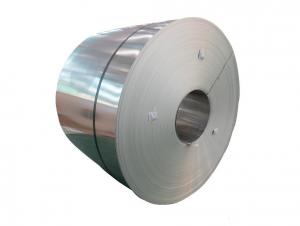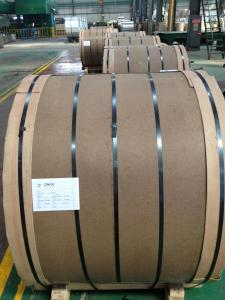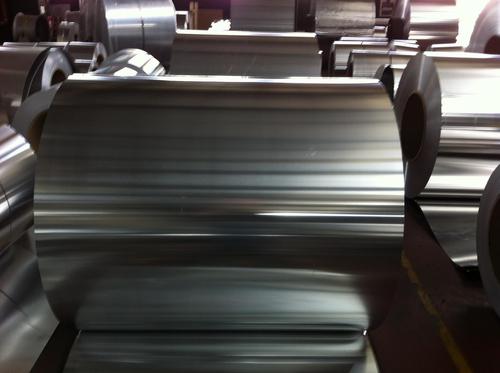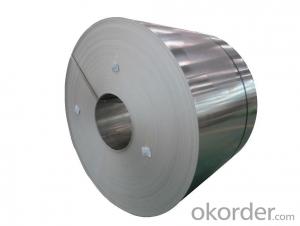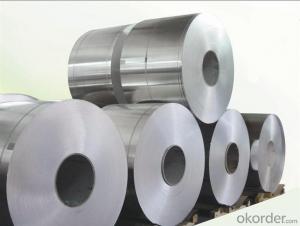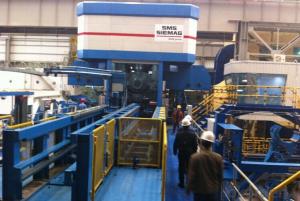Aluminum Coil - Direct Casting Aluminium Strip in Coil AA1100 Temper F
- Loading Port:
- China Main Port
- Payment Terms:
- TT or LC
- Min Order Qty:
- -
- Supply Capability:
- -
OKorder Service Pledge
OKorder Financial Service
You Might Also Like
1.Structure of Product Description
Direct Continuous Aluminium Strip in Coil is one semi-finished aluminium material. The Temper is F, it means Free Temper. This strip can be rolled down to aluminium coil,sheet,circle ect, especially aluminium coils and sheet. The alloy AA1100 is widly used in building, industry ect. Its weight is much lower than steel. So many customers choosed aluminium material instead of steel.
2. Main features of the product
a.Competitive price---We have our own mills and can produce mill finished aluminium coils, so we can control the production cost better.
b.Professional after-sale service---We have more than 15 years exportation experience and you need not worry about the exporation problems.
c.Fast delivery time---We can control the delivery time within 35 days.
3.Image
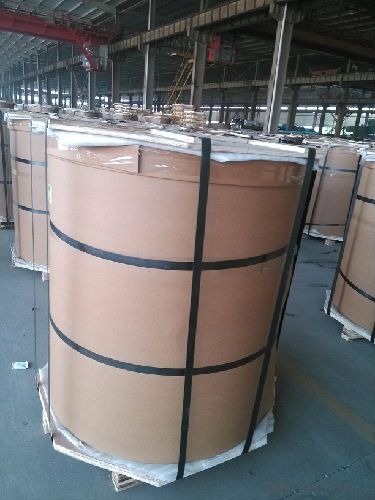
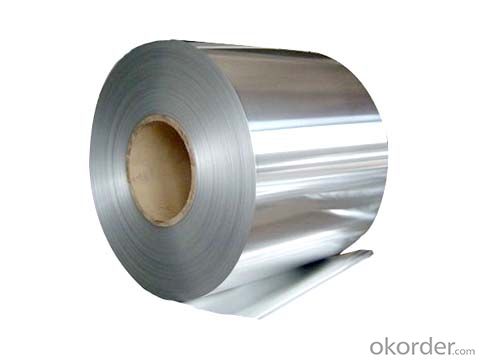
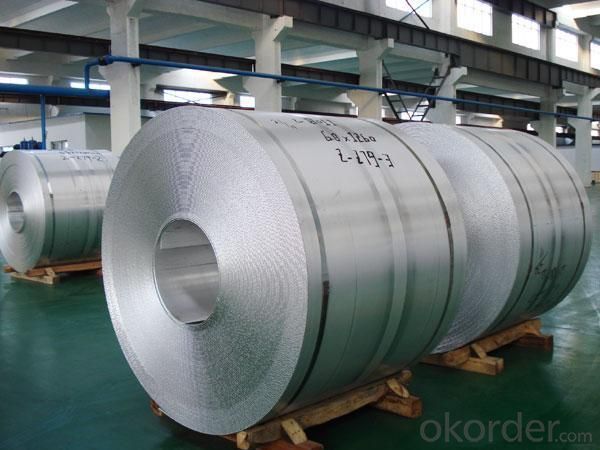
4. Products Specification
| Alloy | Temper | Final Usage | Coil ID | Coil Weight |
| AA1100 | F | Aluminium sheet, coil | 610mm | 5-6 tons |
5. FAQ
What is the quality standard?
---Usually our standard is GB3880-2006
What is the largest width?
---It is 2300mm
What is the MOQ?
---Usually we can accept 80 tons.
- Q: This question asks for a comparison between aluminum coil and iron coil, highlighting their distinct properties and uses.
- <p>Aluminum coil and iron coil differ in several aspects. Aluminum coil is lightweight, corrosion-resistant, and has excellent electrical and thermal conductivity, making it ideal for electrical wiring, heat sinks, and food packaging. Iron coil, on the other hand, is heavier, stronger, and more durable, commonly used in construction, automotive, and heavy machinery due to its high tensile strength. Iron also has magnetic properties, useful in applications like transformers and electromagnets. While aluminum is non-magnetic, it is more cost-effective and has better recyclability compared to iron.</p>
- Q: Can aluminum coils be used in solar panel systems?
- Solar panel systems can indeed utilize aluminum coils. Aluminum is commonly selected as the material for frames and supports in solar panels because of its favorable combination of lightness and strength. Its resistance to corrosion, durability, and impressive thermal conductivity make it an ideal choice for enduring severe weather conditions and efficiently dispersing heat generated by the panels. Furthermore, aluminum is highly recyclable, which aligns perfectly with the environmentally conscious nature of solar energy systems. In conclusion, incorporating aluminum coils into solar panel systems enhances their efficiency, lifespan, and eco-friendliness.
- Q: Can aluminum coils be used in marine or saltwater environments?
- Yes, aluminum coils can be used in marine or saltwater environments. Aluminum is known for its excellent corrosion resistance, making it a suitable material for various marine applications. The oxide layer that naturally forms on the surface of aluminum provides a protective barrier against saltwater and other corrosive elements. This oxide layer can be further enhanced through processes like anodizing or painting, which increases its resistance to corrosion. Additionally, aluminum coils are lightweight, which makes them advantageous for marine applications where weight reduction is desired. Overall, aluminum coils are a popular choice in marine and saltwater environments due to their corrosion resistance and lightweight properties.
- Q: Is it possible to recycle old aluminum coils as scrap metal?
- <p>Yes, old aluminum coils can be used as a source of scrap metal for recycling. Aluminum is a highly recyclable material, and recycling it helps conserve resources and energy. Old aluminum coils can be melted down and repurposed into new aluminum products. It's important to ensure that the coils are clean and free of contaminants before recycling to maintain the quality of the recycled aluminum. Always check with local recycling centers or scrapyards for specific guidelines on recycling aluminum coils.</p>
- Q: What kind of sensor is appropriate for aluminum coil thickness measurement?
- Thickness measurement can be divided into single-point and two-point thickness measurement, the principle of which is to measure thickness of aluminum coil through distance measure sensor. Single-point thickness measurement is to calculate the thickness by measuring the distance between the aluminum coils and then subtracting the distance with fiducial point. Double-point thickness measurement is to calculate the thickness by setting a proper distance between two sensors, putting the aluminum coil between them and measuring the distance and then subtracting the distance with initial distance, which is more accurate than single-point measurement. (Professional thickness measurement sensor is also based on single-point or two-point thickness measurement.) The distance measurement sensor can be divided into laser sensor, eddy current sensor and so on. The measuring range of laser sensor is larger than that of eddy current sensor, but less accurate. The While the accuracy of eddy current sensor is around 0.01%, and the measuring range is around several millimeters to more than ten millimeters.
- Q: This question asks for the most effective methods to clean an aluminum coil, which is a common component in various industries.
- <p>The best ways to clean aluminum coils involve a combination of mechanical and chemical processes. Mechanical cleaning can be done using brushes or pressure washing to remove loose dirt and debris. Chemical cleaning involves using a suitable aluminum cleaner or mild detergent solution to dissolve stubborn grime. Always rinse thoroughly with water to remove any residue. Avoid abrasive materials or harsh chemicals that could scratch the surface. Regular cleaning and maintenance can prevent buildup and extend the coil's lifespan.</p>
- Q: This question asks about the duration an aluminum coil can last before it needs to be replaced or becomes unusable.
- <p>The lifespan of an aluminum coil can vary significantly depending on its application, quality of the material, and environmental conditions. Generally, if properly stored and used, aluminum coils can last for several years without significant degradation. However, in industrial settings where coils are subjected to continuous use and harsh conditions, their lifespan might be reduced to a few years or even less. Regular maintenance and inspection can help extend the lifespan of aluminum coils.</p>
- Q: Are aluminum coils suitable for beverage can manufacturing?
- Aluminum coils are indeed appropriate for the production of beverage cans. Aluminum is the favored material for this purpose because of its numerous beneficial characteristics. To begin with, aluminum is lightweight, enabling easy transportation and handling. This is especially crucial in the beverage industry, where a substantial number of cans are manufactured and distributed. Furthermore, aluminum possesses high malleability, allowing it to be shaped into the desired form without compromising its structural integrity. This quality makes it perfect for the manufacturing of cans, as it can be effortlessly molded into the cylindrical shape required and withstand the pressure exerted by carbonated beverages. Moreover, aluminum is non-toxic, ensuring that it does not contaminate the beverages stored within the cans. It also acts as a protective barrier against light, oxygen, and moisture, effectively preserving the flavor and quality of the beverages. Additionally, aluminum is recyclable, thus making it an environmentally friendly option for can production. The recycling process for aluminum consumes significantly less energy than the production of new aluminum, rendering it a sustainable material choice. In summary, the appropriateness of aluminum coils for beverage can manufacturing is evident due to their lightweight nature, malleability, non-toxicity, preservation properties, and recyclability.
- Q: What are the advantages of using pre-painted aluminum coils?
- There are several advantages of using pre-painted aluminum coils. Firstly, pre-painted aluminum coils come with a durable and long-lasting finish that provides excellent resistance against weathering, corrosion, and UV rays. This makes them ideal for exterior applications, as they maintain their color and appearance over time. Secondly, pre-painted aluminum coils offer a wide range of color options, allowing for greater design flexibility and customization. Whether for architectural, signage, or industrial purposes, there is a vast selection of colors and finishes available to meet specific project requirements. Thirdly, pre-painted aluminum coils are lightweight yet strong, making them easy to handle and install. This reduces labor costs and time during the installation process. Additionally, aluminum is naturally resistant to rust and does not require regular maintenance, resulting in further cost savings. Lastly, pre-painted aluminum coils are environmentally friendly. Aluminum is a highly recyclable material, and the pre-painting process ensures minimal waste and emissions. Using pre-painted aluminum coils not only contributes to sustainable practices but also helps in achieving LEED certifications for green building projects. Overall, the advantages of using pre-painted aluminum coils include durability, customization options, ease of installation, cost-effectiveness, and environmental sustainability.
- Q: What are the methods to prevent rust formation on aluminum coils during storage and transportation?
- <p>To prevent rust on aluminum coils during storage and transportation, ensure that the coils are clean and dry before storage. Store them in a cool, dry place away from moisture and corrosive substances. Use protective wrappings or coatings to shield the coils from the environment. Maintain proper ventilation to reduce humidity. Avoid stacking the coils directly on the ground; use pallets or racks to keep them off damp surfaces. Regularly inspect the coils for signs of moisture or damage and address any issues promptly.</p>
Send your message to us
Aluminum Coil - Direct Casting Aluminium Strip in Coil AA1100 Temper F
- Loading Port:
- China Main Port
- Payment Terms:
- TT or LC
- Min Order Qty:
- -
- Supply Capability:
- -
OKorder Service Pledge
OKorder Financial Service
Similar products
Hot products
Hot Searches
Related keywords

